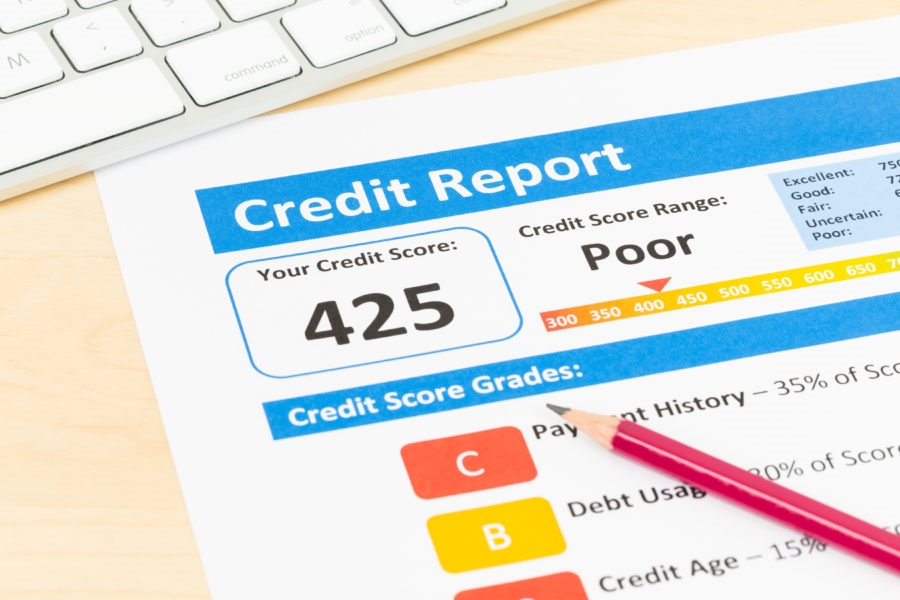
Poor credit score report with pen and keyboard
If you have ever missed a payment on a credit card or fell behind on bill payments, chances are that your credit score was negatively affected. If you have managed to resolve these outstanding debts then depending on a few factors, your credit score would improve over time provided no additional late or missed payments have occurred. Factors that would affect how quickly your bruised credit score can start to repair itself include things like the amount of time that has passed since your last missed payment, the frequency of missed or late payments, how late your payments have been, how high your debt ratios are, and more.
Since a credit bureau can only keep information about late payments and other delinquencies on your credit report for a certain period of time, let us look at the different information that gets reported to the two main credit bureaus, Equifax and TransUnion, and how long this information will remain on your credit record.
The exact time varies by:
- the type of information
- the province or territory you live in
- the credit bureau that created the report
Here is a simplified chart to help illustrate how long the main credit bureaus are likely to retain bad credit information on your file.

How Long Does Bad Credit Stay On Your Record?
Information that affects your credit record
Secured loans
These types of loans are called secured loans because they backed by assets such as properties being given as collateral in exchange for a mortgage loan. Despite having bad credit, you can still qualify for a bad credit mortgage through alternative lenders.
While information about a delinquent secured loan will remain on your record for a period of 7 years to 10 years from the date of filing with Equifax, TransUnion is likely to retain this on your credit report for the same 7 to 10 year, but counting as of the day of the first missed payment.
Legal judgments
Legal Judgements are debts you owe because you lost a legal court case. This information stays on your Equifax credit report for 7 to 10 years, though this can vary depending on what province you live in.
Bank accounts
Sometimes a bank might close a customer’s chequing or savings accounts due to the client committing acts of financial fraud. This kind of information can remain on your credit report for up to six years. Equifax, for example, begins counting the term from the date of fraudulent transaction or default, while TransUnion starts the 6 year period from the date when the bank closed the account or wrote off the bad debt.
Registered items and debts
Information regarding registered items, such as lien against your property, might remain on file for as long as ten years. This can also vary from province to province.
For example, Equifax, keeps this information on your file for 6 years in most provinces with the exception in P.E.I. where they can retain it on your file for 7 to ten years.
TransUnion, on the other hand, is likely to keep this information on your record for five years counted as of the date of filing.
Debt collection
If you have collections agents calling you, then your overdue debt was sent to the collection agency by the creditor. Debt collections will remain on your Equifax credit report for 6 years from the date it was initially sent to a collections agency, while TransUnion will retain the information for 6 years on their reports as of the day that the account first became overdue with the original creditor.
Revolving transactions
Revolving transactions are reported on credit card accounts, lines of credit, and more.
Equifax usually keeps this information on your file record for six years as of the date of your last payment. TransUnion, on the other hand, tends to retains this revolving credit transactions on your file for 6 years starting as of the date that the transaction was first reported as being delinquent.
Hard credit inquiries
Hard inquiries result when a potential lender or creditor requests a copy of your credit report for the purpose of determining your worthiness of obtaining credit or services. These “hard inquiries” tend to stay on your credit report for up to 3 years.
This is why we at Clover Mortgage recommend that you are careful not to apply for credit too frequently. Even if you apply for a few credit cards or retail store credit cards in a matter of a few weeks or a few months, it can have a severely negative impact on your credit score.
Consumer proposals
Consumer proposals are legal agreements set up between you and your creditors, in which the creditor agrees to allow you to pay off a reduced amount of your total debt owing. Consumer proposals are typically purged from credit reports 3 years after the reduced negotiated amount is paid off, or after 6 years from the date that the proposal was filed, whichever comes first.
Bankruptcy
First-time bankruptcies remain on file for a period of usually 6 years from the date of discharge.
TransUnion, however, tends to keep a first-time bankruptcy on record for seven years after the discharge, although they do not have a limit on how long the can display that information on your report.
Equifax, on the other hand, has a limit of 7 years that they are allowed to report a first-time bankruptcy before having to purge it from your credit report.
If someone files for 2 or more bankruptcies in their lifetime, the credit bureaus will keep this information on your record fo 14 years since the date of discharge.
Positive information
Understanding how to maintain a good credit score is important in most people’s day to day lives. Getting approved for a mortgage, applying for renting a place to live or operate a business in, applying for certain jobs, getting a cell phone, etc., is all dependent on having a good credit score. If you have a bad credit history, this can impede you from getting some of those things.
A credit bureau may keep positive information, like payments made on time or keeping a balance of less than 30% of your credit limit, in your credit report for as long as 10 years. The more consistent positive information you build up in your credit history, the faster your credit might improve.
Regularly checking your Equifax credit report is an important step to ensuring that your information is accurate, up to date, and complete. Staying informed about your credit score and situation can help you stay on track to having a great credit score.
You can order a free copy of your credit reports by contacting Equifax or TransUnion.
Business & Finance Articles on Business 2 Community
(68)





